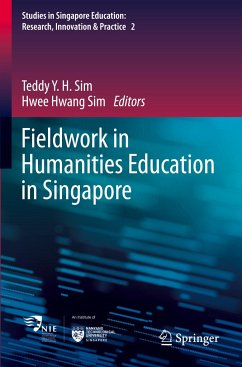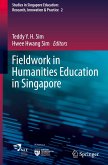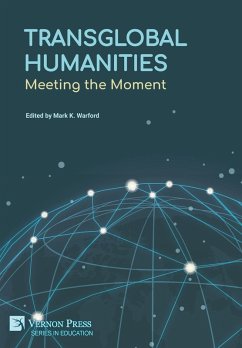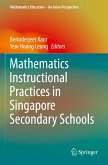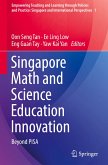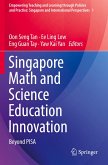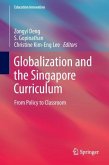Fieldwork in Humanities Education in Singapore
Herausgegeben:Sim, Teddy Y.H.; Sim, Hwee Hwang
Fieldwork in Humanities Education in Singapore
Herausgegeben:Sim, Teddy Y.H.; Sim, Hwee Hwang
- Broschiertes Buch
- Merkliste
- Auf die Merkliste
- Bewerten Bewerten
- Teilen
- Produkt teilen
- Produkterinnerung
- Produkterinnerung
This book addresses the topic of humanities education fieldwork using the Singapore context as its primary focus. It explores how the thought processes behind and techniques of various humanities and social sciences subjects can be applied to fieldwork in a variety of school and training settings. In addition, it discusses how humanities students and educators could stand to benefit from utilizing fieldwork techniques and skills used in archaeology and anthropology, beyond undergraduates majoring in that discipline. Finally, the adoption of multidisciplinary approaches in fieldwork…mehr
Andere Kunden interessierten sich auch für
![Fieldwork in Humanities Education in Singapore Fieldwork in Humanities Education in Singapore]() Fieldwork in Humanities Education in Singapore108,99 €
Fieldwork in Humanities Education in Singapore108,99 €![Transglobal Humanities Transglobal Humanities]() Transglobal Humanities101,99 €
Transglobal Humanities101,99 €![Mathematics Instructional Practices in Singapore Secondary Schools Mathematics Instructional Practices in Singapore Secondary Schools]() Mathematics Instructional Practices in Singapore Secondary Schools77,99 €
Mathematics Instructional Practices in Singapore Secondary Schools77,99 €![Mathematics Instructional Practices in Singapore Secondary Schools Mathematics Instructional Practices in Singapore Secondary Schools]() Mathematics Instructional Practices in Singapore Secondary Schools77,99 €
Mathematics Instructional Practices in Singapore Secondary Schools77,99 €![Singapore Math and Science Education Innovation Singapore Math and Science Education Innovation]() Singapore Math and Science Education Innovation123,99 €
Singapore Math and Science Education Innovation123,99 €![Singapore Math and Science Education Innovation Singapore Math and Science Education Innovation]() Singapore Math and Science Education Innovation123,99 €
Singapore Math and Science Education Innovation123,99 €![Globalization and the Singapore Curriculum Globalization and the Singapore Curriculum]() Globalization and the Singapore Curriculum77,99 €
Globalization and the Singapore Curriculum77,99 €-
-
-
This book addresses the topic of humanities education fieldwork using the Singapore context as its primary focus. It explores how the thought processes behind and techniques of various humanities and social sciences subjects can be applied to fieldwork in a variety of school and training settings. In addition, it discusses how humanities students and educators could stand to benefit from utilizing fieldwork techniques and skills used in archaeology and anthropology, beyond undergraduates majoring in that discipline. Finally, the adoption of multidisciplinary approaches in fieldwork incorporating history, geography, literature and social studies demonstrate how these subjects can collaborate together in actual case studies to facilitate participants' learning in the field.
Produktdetails
- Produktdetails
- Studies in Singapore Education: Research, Innovation & Practice 2
- Verlag: Springer / Springer Nature Singapore / Springer, Berlin
- Artikelnr. des Verlages: 978-981-15-8235-6
- 1st edition 2021
- Seitenzahl: 364
- Erscheinungstermin: 22. Februar 2022
- Englisch
- Abmessung: 235mm x 155mm x 20mm
- Gewicht: 552g
- ISBN-13: 9789811582356
- ISBN-10: 9811582351
- Artikelnr.: 63345269
- Herstellerkennzeichnung Die Herstellerinformationen sind derzeit nicht verfügbar.
- Studies in Singapore Education: Research, Innovation & Practice 2
- Verlag: Springer / Springer Nature Singapore / Springer, Berlin
- Artikelnr. des Verlages: 978-981-15-8235-6
- 1st edition 2021
- Seitenzahl: 364
- Erscheinungstermin: 22. Februar 2022
- Englisch
- Abmessung: 235mm x 155mm x 20mm
- Gewicht: 552g
- ISBN-13: 9789811582356
- ISBN-10: 9811582351
- Artikelnr.: 63345269
- Herstellerkennzeichnung Die Herstellerinformationen sind derzeit nicht verfügbar.
Teddy Y.H. Sim (FRHistS) is currently lecturing at the National Institute of Education in Nanyang Technological University in Singapore. He has published on specific involvements of the Portuguese in the East. He is the author of Portuguese Enterprise in the East: Survival in the Years 1707-57 and editor of Piracy and surreptitious activities in the Malay Archipelago and adjacent seas 1600-1840 and Maritime defence of China: Ming general Qi Jiguang and beyond. Teddy is passionate about fieldtrips in his history courses on South and Southeast Asia. His courses usually feature a local or overseas trip that facilitates as part of the overall study and exploration. Hwee Hwang Sim is a lecturer in the Humanities and Social Studies Education (HSSE) Academic Group at the National Institute of Education (NIE), Nanyang Technological University (NTU). Presently, she teaches Primary Social Studies Education to the degree and post-graduate student teachers. She also teaches Action Research for Social Studies at master's level. She received her BA from the National University of Singapore and her MA (in Instructional Design and Technology) and her PhD (in Education) from NIE, NTU. Prior to her NIE appointment, she was a secondary school teacher in Geography and English, a specialist writer in the Secondary Geography Project Team with the Curriculum Development Institute of Singapore, the Ministry of Education, and later a curriculum specialist in the Secondary Geography Unit in the Curriculum Planning and Development Division in the same ministry. She became the Head of Department (Humanities) in a secondary school after her stint in the ministry. Her research areas are in mentoring, teacher learning and education in primary social studies and geography.
Chapter 1. A brief discussion of issues and summaries of chapters.- Part I. Pedagogical Frameworks, Practices and Perceptions.- Chapter 2. "Educating the philosopher-leader: Fieldtrips, outdoors and wonder".- Chapter 3. A case for 'everyday spaces' in historical fieldtrips.- Chapter 4. Kampong Glam: Appreciating the history beyond the 'Glam.- Chapter 5. Historical fieldwork as reflection on the uses of history.- Chapter 6. Inquiry-based fieldwork for children's localities and beyond in primary social studies: Student teachers' understandings, concerns and suggestions.- Chapter 7. US and Singapore teachers views on teaching history through fieldtrips.- Part II. Role of Archaeology and Anthropology.- Chapter 8. Archaeological approaches and possibilities in humanities/social science education in Singapore.- Chapter 9. How maritime archaeology can contribute to the learning of 17th and 18th century Singapore History in Schools.- Chapter 10. MultidisciplinaryArchaeological Field Schools.- Chapter 11. A case study on the incorporation of museum-based fieldtrips in the teaching of ancient Singapore history: Teacher reflections and student learning.- Part III. Case Studies in the Field: Mono and Multidisciplinary Dimensions.- Chapter 12. Visiting sites of war commemoration in Singapore - How visiting war memorials can contribute to the learning of the past for trainers and trainees.- Chapter 13. Exploring Singapore as an archetypical urban settlement in Southeast Asian history: A walk about the town on a 19th century map.- Chapter 14. Combining text and travel in the studying of the Dutch East Indies: Incorporating fieldtrips in the teaching of a history course on Southeast Asia.- Chapter 15. Tracing the changing meaning(s) of a heritage space through geographical fieldwork.- Chapter 16. A sense of place': Understanding fieldtrips through cross-disciplinary perspectives.- Chapter 17. A case of multidisciplinary learningon disciplinary trips - A summative reflection.- Index.
Chapter 1. A brief discussion of issues and summaries of chapters.- Part I. Pedagogical Frameworks, Practices and Perceptions.- Chapter 2. "Educating the philosopher-leader: Fieldtrips, outdoors and wonder".- Chapter 3. A case for 'everyday spaces' in historical fieldtrips.- Chapter 4. Kampong Glam: Appreciating the history beyond the 'Glam.- Chapter 5. Historical fieldwork as reflection on the uses of history.- Chapter 6. Inquiry-based fieldwork for children's localities and beyond in primary social studies: Student teachers' understandings, concerns and suggestions.- Chapter 7. US and Singapore teachers views on teaching history through fieldtrips.- Part II. Role of Archaeology and Anthropology.- Chapter 8. Archaeological approaches and possibilities in humanities/social science education in Singapore.- Chapter 9. How maritime archaeology can contribute to the learning of 17th and 18th century Singapore History in Schools.- Chapter 10. MultidisciplinaryArchaeological Field Schools.- Chapter 11. A case study on the incorporation of museum-based fieldtrips in the teaching of ancient Singapore history: Teacher reflections and student learning.- Part III. Case Studies in the Field: Mono and Multidisciplinary Dimensions.- Chapter 12. Visiting sites of war commemoration in Singapore - How visiting war memorials can contribute to the learning of the past for trainers and trainees.- Chapter 13. Exploring Singapore as an archetypical urban settlement in Southeast Asian history: A walk about the town on a 19th century map.- Chapter 14. Combining text and travel in the studying of the Dutch East Indies: Incorporating fieldtrips in the teaching of a history course on Southeast Asia.- Chapter 15. Tracing the changing meaning(s) of a heritage space through geographical fieldwork.- Chapter 16. A sense of place': Understanding fieldtrips through cross-disciplinary perspectives.- Chapter 17. A case of multidisciplinary learningon disciplinary trips - A summative reflection.- Index.

